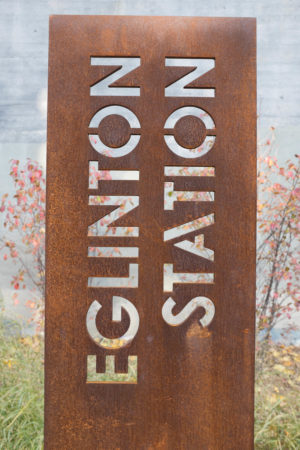Reading under autumn leaves
Beltline Trail
“EGLINTON STATION”
Theories for why the University of Toronto divested from fossil fuels
Not mutually exclusive:
- They are about to launch a bicentennial fundraising campaign with themes including healthy lives, sustainable future, and the next generation. They feared negative public relations attention if they launched the campaign while continuing to refuse to divest
- The university’s investment managers have decided that they can better retain authority and control by choosing how to divest on their own terms, and particularly with little reference to the culpability of the industry
- In trying to implement the prior environmental, social, and governance (ESG) screening method, the investment managers at the University of Toronto Asset Management (UTAM) corporation decided that divestment would be easier or better based on their secret internal metrics
- The Harvard announcement and COP26 have added to the pressure to announce new efforts
- U of T perceived that it was increasingly behind when a growing number of Canadian schools had made divestment commitments
- A student-led volunteer campaign persisted through multiple setbacks and core cohort graduations and was sustained by the University of Toronto Leap Manifesto chapter and subsequently the Divestment & Beyond faculty- and union-led campaign after the Toronto350.org / UofT350.org effort
As in the campaign as a whole, the university’s penchant for secrecy makes it challenging to explain or understand their actions. In particular, that includes the parlour trick of setting up your own investment management corporation as a means of evading oversight, by pretending that somehow the advice from this organization should only be available to the administration in secret.
Divest Podcast on the Leap Manifesto U of T divestment campaign
The latest episode of The Divest Podcast features Julia DaSilva from the Leap Manifesto chapter at U of T, the second of three groups to organize divestment campaigns, after the Toronto350.org / UofT350.org campaign and before / concurrently with the faculty/union Divestment & Beyond campaign.
Early environmentalism
The pro-carbon chorus at COP26
From today’s Globe and Mail:
- Efforts to combat climate change shouldn’t shun any particular energy source, Saudi official says
- Harper says Canada’s climate-change policy unfairly singles out ‘certain parts of the country’
I know Canada’s major media sources tend to be reflexively pro-fossil, but it’s still remarkable to see people insisting that the industries causing climate change should not be targeted as we try to keep it from destroying us.
Open thread: Urban thru hiking
Apparently it’s something that’s starting to exist:
Day hiking within city limits isn’t a new concept, of course. There are guidebooks detailing trails in cities from San Francisco to Atlanta. But Thomas has pushed the pursuit further, mapping out routes as long as 200 miles from one corner of a city to another and using infrastructure like stairways and public art to rack up elevation gain and provide something approximating a vista. She started in 2013 with a 220-mile through-hike in Los Angeles called the Inman 300, named for one of its creators, Bob Inman, and the initial number of stairways it included. Among other efforts, she has since hiked 60 miles through Chicago, 200 miles in Seattle, and 210 miles in Portland, Oregon. In 2015, she trekked the 54 miles from Selma to Montgomery, Alabama, on the 50th anniversary of that historic civil rights march.
The way I see it, urban thru hiking lets you walk more comfortably with less gear since you never need to make camp. Routes that amount to a serious sustained hike can be added up from segments which avoid car traffic as much as possible, and which link up with public transit to let you get home at the end of the day and back at the trailhead easily the next one.
Related:
Summarizing and prioritizing
I got an insight on dissertation writing from the Spycast podcast’s interview with former vice presidential daily intelligence briefer Dave Terry:
This isn’t a be-all-end-all book. It’s a tailored 300-page briefing for senior faculty members. That perspective should help lessen the pain of cutting carefully researched content. It’s not that it’s bad, it just doesn’t belong in a briefing of this length and purpose.






